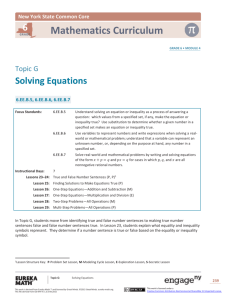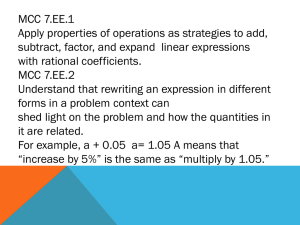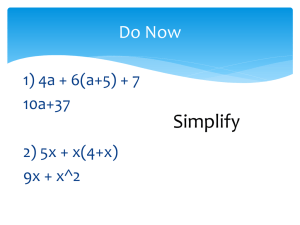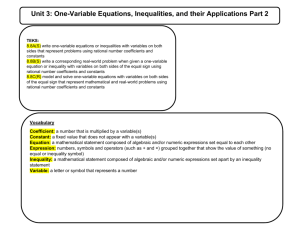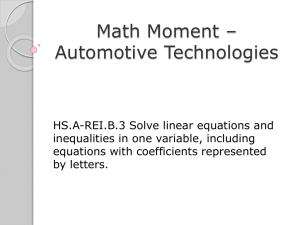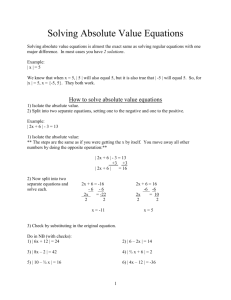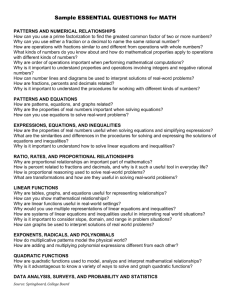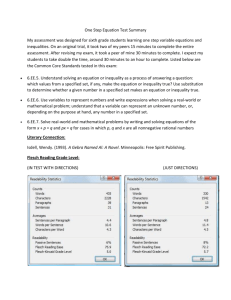New York State Common Core Mathematics
advertisement
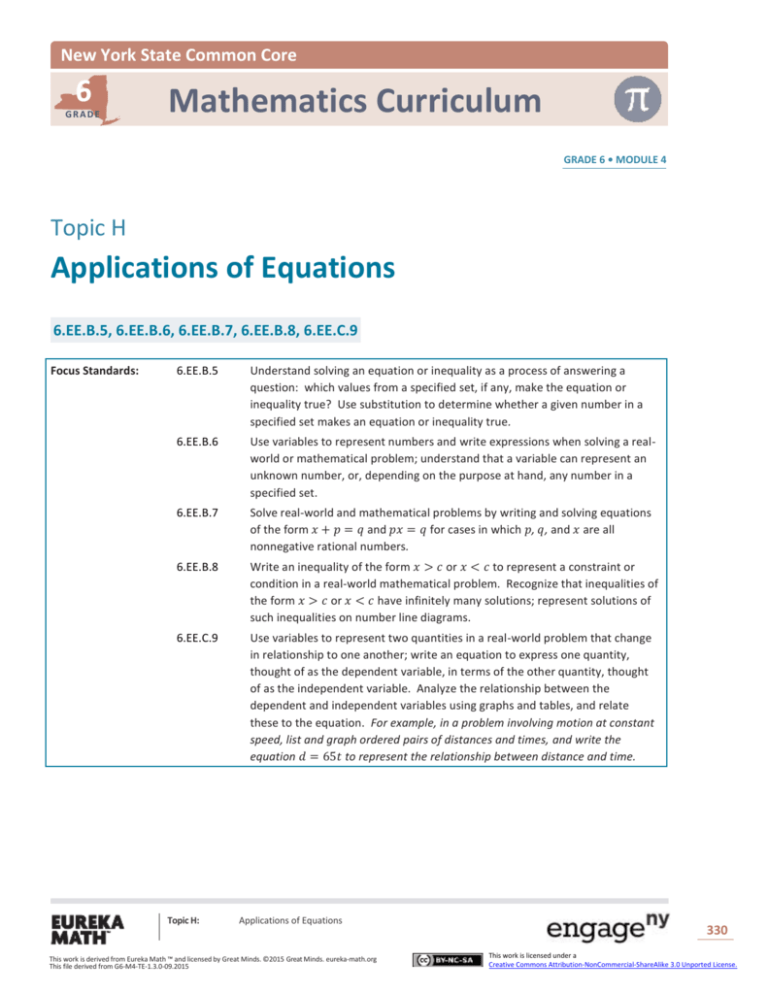
New York State Common Core 6 GRADE Mathematics Curriculum GRADE 6 • MODULE 4 Topic H Applications of Equations 6.EE.B.5, 6.EE.B.6, 6.EE.B.7, 6.EE.B.8, 6.EE.C.9 Focus Standards: 6.EE.B.5 Understand solving an equation or inequality as a process of answering a question: which values from a specified set, if any, make the equation or inequality true? Use substitution to determine whether a given number in a specified set makes an equation or inequality true. 6.EE.B.6 Use variables to represent numbers and write expressions when solving a realworld or mathematical problem; understand that a variable can represent an unknown number, or, depending on the purpose at hand, any number in a specified set. 6.EE.B.7 Solve real-world and mathematical problems by writing and solving equations of the form 𝑥 + 𝑝 = 𝑞 and 𝑝𝑥 = 𝑞 for cases in which 𝑝, 𝑞, and 𝑥 are all nonnegative rational numbers. 6.EE.B.8 Write an inequality of the form 𝑥 > 𝑐 or 𝑥 < 𝑐 to represent a constraint or condition in a real-world mathematical problem. Recognize that inequalities of the form 𝑥 > 𝑐 or 𝑥 < 𝑐 have infinitely many solutions; represent solutions of such inequalities on number line diagrams. 6.EE.C.9 Use variables to represent two quantities in a real-world problem that change in relationship to one another; write an equation to express one quantity, thought of as the dependent variable, in terms of the other quantity, thought of as the independent variable. Analyze the relationship between the dependent and independent variables using graphs and tables, and relate these to the equation. For example, in a problem involving motion at constant speed, list and graph ordered pairs of distances and times, and write the equation 𝑑 = 65𝑡 to represent the relationship between distance and time. Topic H: Applications of Equations This work is derived from Eureka Math ™ and licensed by Great Minds. ©2015 Great Minds. eureka-math.org This file derived from G6-M4-TE-1.3.0-09.2015 330 This work is licensed under a Creative Commons Attribution-NonCommercial-ShareAlike 3.0 Unported License. Topic H NYS COMMON CORE MATHEMATICS CURRICULUM Instructional Days: 6•4 5 Lesson 30: One-Step Problems in the Real World (P) 1 Lesson 31: Problems in Mathematical Terms (P) Lesson 32: Multi-Step Problems in the Real World (P) Lesson 33: From Equations to Inequalities (P) Lesson 34: Writing and Graphing Inequalities in Real-World Problems (P) In Topic H, students apply their knowledge from the entire module to solve equations in real-world, contextual problems. In Lesson 30, students use prior knowledge from Grade 4 to solve missing angle problems. Students write and solve one-step equations in order to determine a missing angle. Lesson 31 involves students using their prior knowledge from Module 1 to construct tables of independent and dependent values in order to analyze equations with two variables from real-life contexts. They represent equations by plotting values from the tables on a coordinate grid in Lesson 32. The module concludes with Lessons 33 and 34, where students refer to true and false number sentences in order to move from solving equations to writing inequalities that represent a constraint or condition in real-life or mathematical problems. Students understand that inequalities have infinitely many solutions and represent those solutions on number line diagrams. 1 Lesson Structure Key: P-Problem Set Lesson, M-Modeling Cycle Lesson, E-Exploration Lesson, S-Socratic Lesson Topic H: Applications of Equations This work is derived from Eureka Math ™ and licensed by Great Minds. ©2015 Great Minds. eureka-math.org This file derived from G6-M4-TE-1.3.0-09.2015 331 This work is licensed under a Creative Commons Attribution-NonCommercial-ShareAlike 3.0 Unported License.

